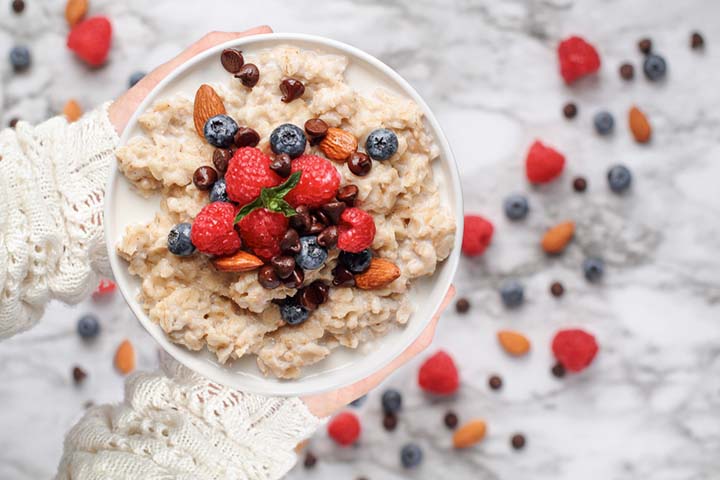Sleep deprivation and fatigue during breastfeeding are common complaints among mothers. These could be compounded by postpartum exhaustion, as your body uses energy to break down your food to make various breast milk components.
In addition, sleepless nights and an inconsistent diet might make you more tired. However, this fatigue is not a long-term concern and usually resolves after a few weeks.
This post discusses why a woman feels fatigued when breastfeeding and how to deal with it.
What Causes Fatigue During Breastfeeding?
Here are some of the possible causes of fatigue while breastfeeding:
1. Lack of sleep:
- After your delivery, you may not get adequate rest and sleep as you have to wake up through the night due to nursing schedules and diaper changes.
- The constant disruption in your sleep cycles from feeding, sore nipples, and caring for your newborn might cause fatigue.
- Your chances of experiencing severe fatigue and low energy are high if your baby has coliciXA condition characterized by an infant crying for three or more hours a day, three or more days a week, for three or more weeks, is a poor sleeper, needs frequent night feedings, and is born prematurely.
Reflecting on her challenging breastfeeding journey with a colicky baby, Meghna Middha, a mother of two, states, “I confess that the thought of breastfeeding was a little daunting initially, but I was ready to do whatever I could to make this work. It wasn’t easy; it was followed by many sleepless nights, overcoming cracked nipples, and engorgement, mastitis. He (her son) had colic and didn’t sleep at night for the first three months. I remember caressing him, rocking him, feeding him, holding him closer, singing to him, feeding him again. The feeding hours were longer during the night, were tedious, and left me irritated at times. But at the same time, I also remember the happiness I felt from within, which was insurmountable. Despite all the initial struggles, we had a good start. Our pediatrician was well informed and encouraged me to move further with it (i).”
- Most doctors will suggest you take a nap whenever your little one is napping. You can also ask a family member or friend to watch over your baby and older children so that you can get a “power nap” for two to three hours.
2. Infections:
- A breast infection during lactation can lead to severe fatigue.
- Mastitis is an infection that occurs when your breast tissue gets infected with harmful germs. Although mastitis causes mothers to feel ill it does not usually affect milk supply.
- In addition to fatigue, mastitis can even induce several other symptoms, including , breast tenderness, redness, pain, or high fever.
- Seek medical guidance, if you encounter any of the above symptoms. Doctors often need to prescribe antibiotics to treat mastitis.
3. Thyroid problems:
- Postpartum Thyroiditis (inflammation of the thyroid gland) may cause hyperthyroidismiXWhen the thyroid gland produces more thyroid hormones than the body requiresor hypothyroidismiXThe inability of the thyroid gland to produce the necessary amounts of thyroid hormone. Postpartum thyroid problems can affect a mother’s sleep and cause insomnia and severe lethargy.
- If your doctor checks your thyroid function labs and finds they are abnormal, they will prescribe medication to normalize your thyroid gland functioning and help you feel energized.
4. Unhealthy eating habits:
- During the lactation period, it is essential to ensure your diet is balanced and full of vitamins and other vital nutrients to help you stay energized and prevent maternal exhaustion.
- Unhealthy eating habits, such as eating greasy or junk foods and excess caffeine intake, can make you sluggish.
- Try to eat foods rich in fiber, protein, calcium, and iron during your lactating phase.
- Dehydration from not drinking enough fluids while breastfeeding can also make mothers feel tired and sluggish.
5. Anemia:
- Another cause of fatigue during lactation is anemia, which is a low red blood cell count. The blood loss that occurs during childbirth can trigger anemia.
- To overcome anemia, you will likely need to take iron supplements and eat iron rich foods like beans, chickpeas, lentils, lean red meats, seafood, and iron-fortified cereal (1).
- A meta-analysis conducted by researchers from Copenhagen University has found that oral iron treatment during pregnancy lowers the risk of iron deficiency anemia at term by 0.51 times more than mothers who do not take iron supplementation.
Natural Ways To Regain Energy While Breastfeeding
Breastfeeding is the best way to feed your newborn baby, and ensure that your little one will get all of the nutrients needed for her growth and development. But breastfeeding often makes moms feel tired, fatigued and sluggish.
Here are some effective natural ways to boost your energy while you are nursing:
1. Eat Right:
- You need to ensure that your daily diet is full of healthy nutrients and minerals that supply adequate energy to your body.
- Include protein in your diet, as it boosts your energy level naturally. Some of the best protein-rich foods that you can eat while breastfeeding are lean meats, milk, nuts, cheese, seeds, fish, and legumes.
- Foods rich in fiber content can also enhance your energy level and help you get rid of digestive problems. Some of the best fiber-rich foods are whole-wheat bread and pasta, fruits, vegetables, and brown rice.
2. Drink plenty of water:
- Not drinking enough water can dehydrate you, which drains all your energy, leading to fatigue.
- During breastfeeding, you feel thirstier than normal, and drinking enough water keeps you energized and also quenches your thirst.
- You should aim to drink at least 12-13 cups of water every day during breastfeeding and keep yourself hydrated.
3. Exercise:
- You may think that physical activity will drain your energy and may make you feel fatigued and tired, but healthy exercise will actually boost your energy level.
- Light exercise during breastfeeding can elevate your energy level, help you fight against fatigue, and lower stress levels and depression.
When To Visit The Doctor?
If you continue to feel exhausted while breastfeeding and feel you are going through baby blues even after making healthy lifestyle and dietary changes, you will need to visit your doctor. As discussed earlier, nutritional deficiencies can cause fatigue during lactation, and the doctor may prescribe supplements accordingly. Postpartum depressioniXA medical condition characterized by sadness, anxiety, and fatigue for a prolonged period after childbirth can also make new moms feel fatigued, sad, and lose interest in participating in favorite activities. If you have any concerns that you might be depressed please talk to your medical specialist about possible treatments for depression.
Best Foods To Eat To Fight Fatigue During Breastfeeding
Here is a complete list of super food that you can consume during breastfeeding to help overcome fatigue:
1. Bananas:
- Bananas are a rich source of potassium that your body needs to convert sugars (carbohydrates) into energy.
- Bananas also contain a high percentage of healthy nutrients such as vitamin C, fiber, B vitamins, omega-3 fatty acids, and carbohydrates. All these nutrients help you beat fatigue, tiredness and dehydration during breastfeeding.
- The natural sugars present in bananas, like fructose, sucroseiXChemical name for table sugar, formed when glucose and fructose combine, and glucose, serve as a quick energy booster.
- You can safely consume 1 to 2 bananas daily or even enjoy a delicious banana shake or smoothie to elevate your energy level.
2. Green tea:
- Drinking a cup of refreshing green tea can help you fight fatigue and stress associated with having a new baby.
- Green tea contains a high concentration of polyphenolsiXAntioxidant compounds found in food items such as fruits, vegetables, coffee, tea, and winethat help to stress, improve your mental focus, and boost energy.
- The essential components of green tea can stabilize your metabolism and bolster your immune system, protecting you from infections.
- To make a cup of homemade green tea, you can steep one tsp. of green tea in a cup of hot water. Strain the tea into a cup and add honey to flavor it. Drink green tea at least 2-3 times a day to feel refreshed and energized.
- One word of caution is to make sure that the green tea you drink does not contain caffeine or herbs that may be harmful to your baby, such as ginsengiXA tropical plant root known for its anti-inflammatory and antioxidant effectsor ginkgoiXA popular herb approved for the treatment of dementia.
3. Oatmeal:
- Oatmeal helps to fight fatigue. It contains quality carbohydrates in the form of glycogen, which fuels your brain and muscles for the entire day.
- Other energy-boosting nutrients present in oatmeal, like phosphorous, magnesium, vitamin B1, and protein, help you feel energized.
- Oatmeal also contains a high concentration of fiber, as a super food in improving your digestive health.
4. Yogurt:
- The carbohydrates, protein and probiotics present in yogurt help to fight the symptoms of fatigue.
- Yogurt also helps to improve your digestive health.
- You can eat fat-free yogurt anytime of the day. If you do not like the flavor of plain yogurt, you can add fresh fruits, seeds, nuts, and or granola to prepare a homemade smoothie.
Fatigue during breastfeeding is a common complaint in women. This may happen due to restless nights, breast infection, or unhealthy eating habits. However, since breastfeeding is essential for infants, mothers cannot avoid it. So, they need to find other ways to overcome their fatigue. They may do so by eating a well-balanced diet, drinking adequate water, and exercising regularly. You may also include foods such as bananas and oatmeal to provide the nutrients that help combat fatigue. However, consult a doctor if you cannot manage your fatigue even after changing your lifestyle.
Key Pointers
- Hormonal changes, sleeplessness, and other medical conditions may lead to fatigue while breastfeeding.
- Maintaining a healthy lifestyle, adequate sleep hours, and a healthy diet can help manage fatigue.
- Staying hydrated, engaging in light physical activity, and seeking emotional and physical support can help alleviate stress and fatigue.
- Nevertheless, if fatigue is chronic, worsens over time, or is accompanied by other symptoms, it’s crucial to seek medical advice.
Experience the joys and challenges of breastfeeding firsthand, as this video delves into the normalcy of fatigue during this remarkable journey.















